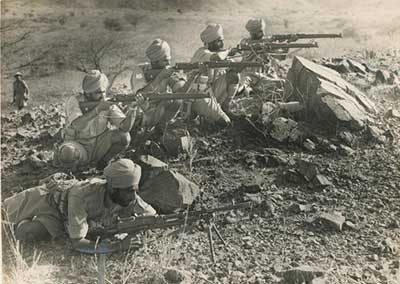Date: 11/11/2022
Relevance: GS-1: Modern Indian History from about the middle of the eighteenth century until the present- significant events, personalities, issues.
Key Phrases: fascism, Indian National Army, Indian independence, First World War, Second World War, India’s contribution to the world wars, Victoria Crosses, Commonwealth, Jallianwalla Bagh.
Why in News?
- The First and Second World Wars were two events that forever altered the course of history. Therefore, it should be of little surprise that India played a vital yet lesser-known role.
Time to honour India’s contribution to world wars:
- Indian blood was spilled in Europe, as it was in Africa, West Asia, and Asia. The memory of the almost 10 million battlefield deaths in the First World War and the 15 million or more who were killed fighting the Second World War is now honoured in countries around the world on November 11, with nationwide silences and the laying of wreaths.
- But not so much in India — apart from in Army cantonments and at the British Consulate in Kolkata — even though over 1,61,000 men made the ultimate sacrifice for India’s freedom.
- Seventy-five years after Independence, it is time to honour India’s immense contribution to the world wars and move it from a footnote in another country’s history to the main stage, where it belongs. These were India’s wars too.
Two conflicts and a reticence:
- Indian reticence over these two conflicts arises from the uneasy relationship between the Indian contribution to fighting fascism on a global stage and the nationalist movement for freedom at home.
- The success of the first is seen to have come at the cost of the second.
- It began with the betrayal of nationalist expectations of greater autonomy for India in return for support during the Great War.
- This was compounded by the bitterness of Viceroy Lord Linlithgow declaring war on Germany on India’s behalf in 1939 without consulting Indian leaders, and further roiled by the pitting of India against India when Netaji Subhas Chandra Bose’s Indian National Army sided with the Axis Powers in the hope that this might bring freedom.
- But the failure of the Indian independence to follow automatically from India’s participation in the wars does not mean that the war efforts extended colonial rule, or were all about protecting Britain: there was fighting on Indian soil to defend India.
- Yet, the prevailing impression remains that of wars fought for somebody else, somewhere else; consequently, India’s valuable contribution has been written out of its history books.
India’s pivotal role:
- First world war:
- Almost 1.5 million men volunteered to fight in the Great War.
- Indians mobilized four days after Britain declared war on Germany, with the support of nationalist leaders, including Mahatma Gandhi.
- Indians fought with valour and distinction in the trenches of Europe, West Asia, and North Africa, earning 11 Victoria Crosses along the way. Of those men, about 74,000 never came home.
- Second world war:
- India raised the largest ever volunteer army, of 2.5 million, for the Second World War.
- More than 87,000 of those men are cremated or buried in war cemeteries around the world and in India.
- Thirty-one Victoria Crosses — 15 % of the total — went to soldiers from undivided India.
- Britain’s recognition of India’s efforts:
- Without Indian soldiers, non-combatant labourers, material, and money, the course of both conflicts would have been very different as acknowledged by Field Marshal Auchinleck, Britain’s last Commander in-Chief of the Indian Army. And yet, there is no recognition within India of this history.
- In Britain, the contribution of the Commonwealth — including the Indian subcontinent — is memorialized in the Commonwealth Memorial Gates that lead up to Buckingham Palace.
- The Gates commemorate the campaigns where Commonwealth soldiers served with distinction; there is also a canopy inscribed with the names of the Commonwealth recipients of the George and Victoria Crosses.
- Much of India’s recent history is encapsulated in these gates, in a spirit of gratitude and equality.
Reluctance on the part of India to recognize its war efforts:
- Some of this ambivalence owes itself to the atrocities of colonial history, which must be acknowledged too.
- Britain may have handed out 11 VCs over the course of the First World War, but it betrayed the hopes of nationalists with the imposition of martial law after the war ended, culminating in the horror of Jallianwalla Bagh in April 1919.
- British perfidy, however, does not in any way reduce the sacrifices of those who fought for freedom.
- Those who went abroad to fight alongside white British soldiers returned with the knowledge that they were equal to their colonial masters. In not recognizing and honouring this, we push those men back into colonial subjugation.
Conclusion:
- Our today has been built on the sacrifice of many, including those who died fighting fascism. Let us remember and honour them.
- The time has come for India to put the wars in their proper historical context and celebrate the extraordinary contributions of the Indian people in defeating fascism and making of the modern world order.
Source: The Hindu
Mains Question:
Q. What role did India play in the First and Second World Wars? Why is there a reluctance on the part of India to recognize its war efforts?








